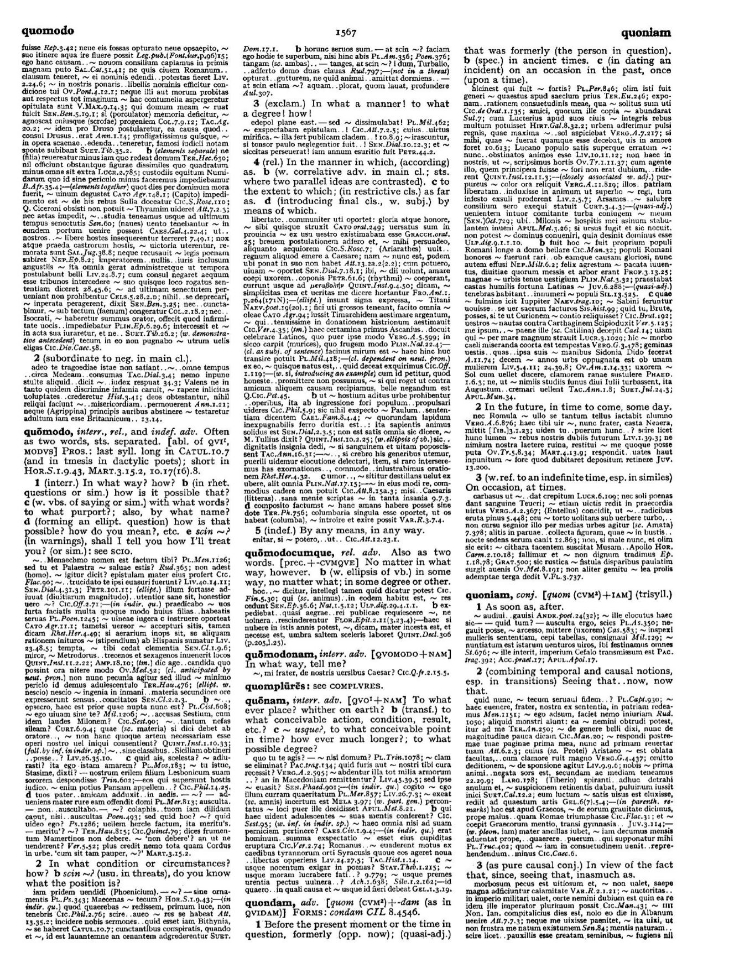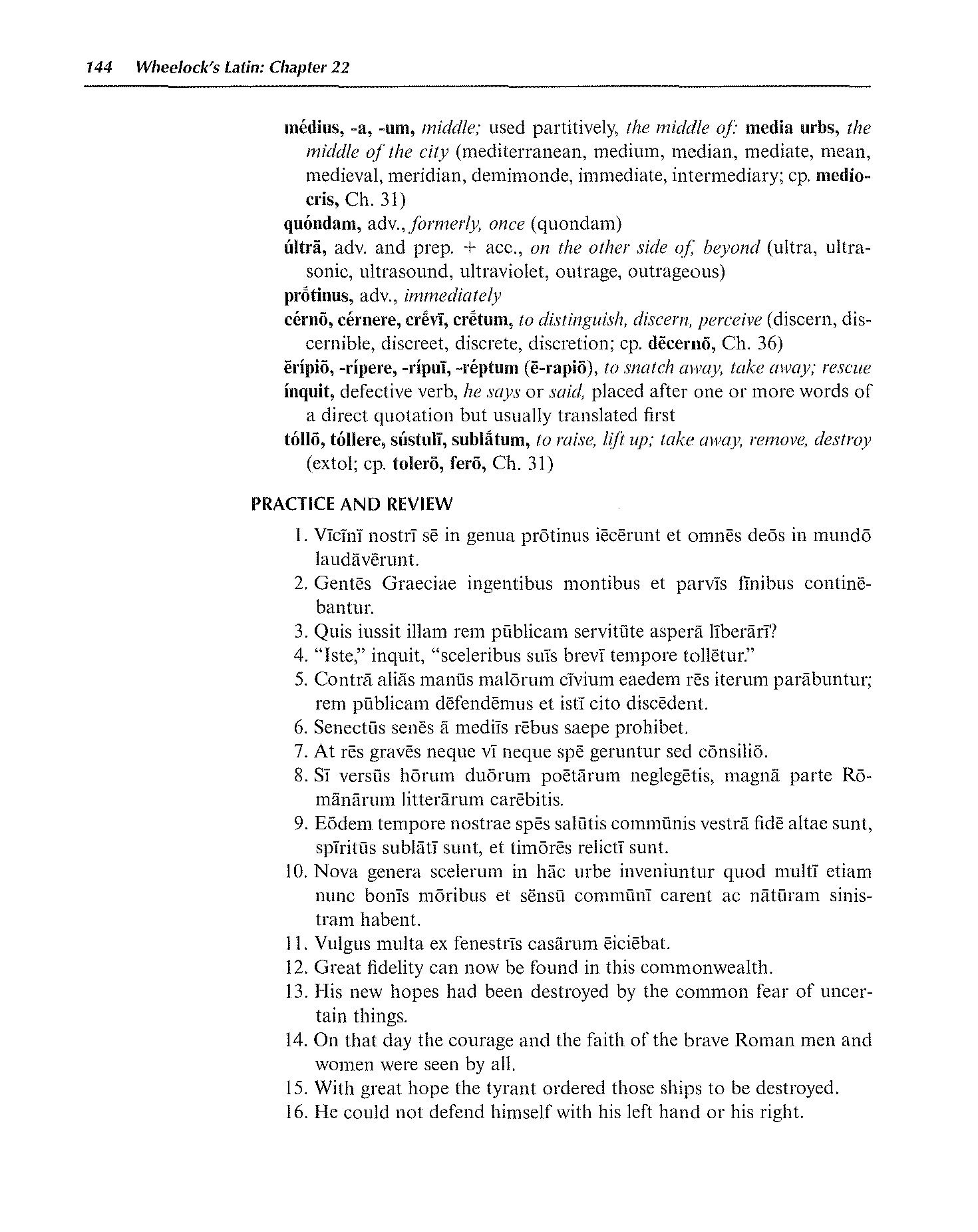
page_listing.tpl
page_subListingDetails.tpl
sub_listingDetails_style1.tpl
sub_listingDetails.title.tpl
quondam formerly
quondam is a Latin Adverb that primarily means formerly.
Definitions for quondam
Wheelock's Latin
Adverb
- 1
formerly, once
Oxford Latin Dictionary
Adverb
- 1
Before the present moment or the time in question, formerly (opp. now); (quasi-adj.) that was formerly (the person in question). (b) (spec.) in ancient times. (c) (in dating an incident) on an occasion in the past, once upon a time.
- 2
In the future, in time to come, one day.
Sentences with quondam
Latin to English
Ingenium quondam fuerat pretiosius auro; at nunc barbaria est grandis, habere nihil.Compare Time was when genius was more precious than gold, but now to have nothing is monstrous barbarism.
Praestabat castas humilis fortuna Latina quondam.Compare Humble circumstances formerly kept the Latin women chaste.
Recordatus quondam super cenam, quod nihil cuiquam toto die praestitisset, memorabilem illam meritoque laudatam vocem edidit: "Amici, diem perdidi." [Divus Titus, VIII,1]Compare On one occasion, recalling at dinner that he [Titus] had not granted a single favor all day, he uttered this memorable and justly praised remark: "Friends, I have lost a day."
Argi et Lacedaemon, duo clarus urbs, lumen quondam Graceia, sub pes tuus relinquo?Compare Shall we leave beneath your feet Argos and Lacedaemon, two most illustrious cities, once the luminaries of Greece?
Non sum animus Etrusci, qui Porsena quondam maioresque is sum.Compare The Etrusians have not the courage, which Porsena and their ancestors once had.
Data sources
Notes
- Definitions
- Frederick M. Wheelock, Wheelock's Latin, 6th ed., rev. Richard A. LaFleur (New York, NY: HarperCollins Publishers, 2005): 144.
- P. G. W. Glare, Oxford Latin Dictionary, Vols. 1-8 (Oxford: Clarendon Press, 1982): 1567.
- Word frequencies
- Christopher Francese, "Latin Core Vocabulary," Dickinson College Commentaries, last modified 2014, http://dcc.dickinson.edu.
- Paul B. Diederich, The Frequency of Latin Words and Their Endings, PhD diss., (Columbia University, 1939).
Bibliography
Allen, Joseph H. Allen and Greenough's New Latin Grammar for Schools and Colleges: Founded on Comparative Grammar. Edited by James B. Greenough, George L. Kittredge, Albert A. Howard, and Benjamin L. D'Ooge. Boston, MA: Ginn & Company, 1903.
Crystal, David. A Dictionary of Linguistics and Phonetics. 6th ed. Oxford, UK: Blackwell Publishing, 2008.
Delatte, Louis, Suzanne Govaerts, Joseph Denooz, and Etienne Evrard. Dictionnaire fréquentiel et index inverse de la langue latine [Frequency Dictionary and Inverse Index of the Latin Language]. Liège, Belgium: Laboratoire d'analyse statistique des langues anciennes de l'Université de Liège (L.A.S.L.A.), 1981.
Diederich, Paul B. The Frequency of Latin Words and Their Endings. PhD diss., Columbia University, 1939.
Francese, Christopher. "Latin Core Vocabulary." Dickinson College Commentaries. Last modified 2014. http://dcc.dickinson.edu/latin-vocabulary-list.
Gildersleeve, Basil L., and Gonzales Lodge. Gildersleeve's Latin Grammar: Third Edition, Revised, and Enlarged. 3rd ed. London, England: Macmillan and Co., 1903.
Glare, Peter G.W. Oxford Latin Dictionary. Vols. 1-8. Oxford, England: Clarendon Press, 1982.
Krüger, Bernd. "Latin Conjugation Tables." Cactus2000. Accessed May 5, 2023. https://latin.cactus2000.de/index.en.php.
Pierson, Nick. "Sound of Text." Accessed October 26, 2019. https://soundoftext.com.
Wheelock, Frederick M. Wheelock's Latin. 6th ed. Revised by Richard A. LaFleur. New York, NY: HarperCollins Publishers, 2005.
Wiktionary Contributors. "Victionarium." Wikimedia Foundation, Inc. Updated March 18, 2019. https://la.wiktionary.org/wiki/Victionarium:Pagina_prima.
Citation
Chicago (17th ed.)
Allo Contributors. "quondam (adv.) - Latin Word Definition." Allo Latin Dictionary. Last modified . Accessed February 20, 2026. http://ancientlanguages.org/latin/dictionary/quondam.
Entry created on . Last updated on .







